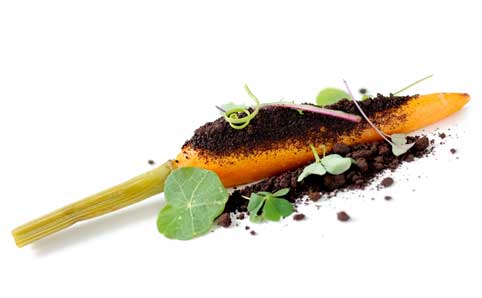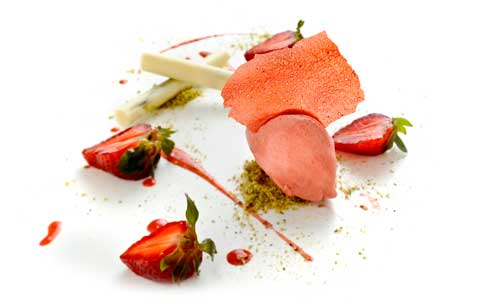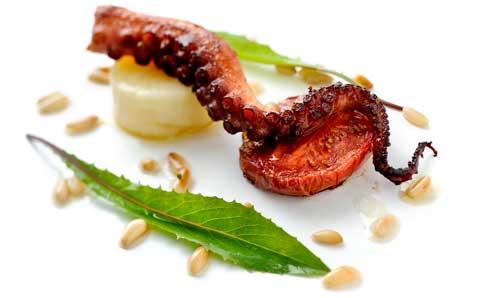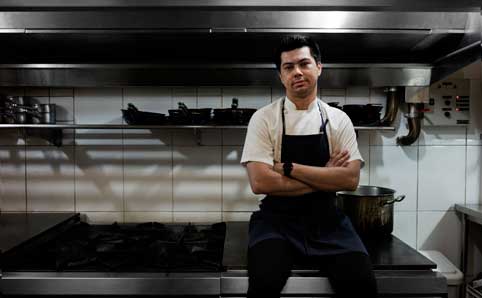
It’s a bucolic spring setting as crowds mill about in the sunshine during August’s Festival de Gastronomia in the historic town of Tiradentes, surrounded on all sides by rolling green hills. Two of the least glamorous of those gathered are the young chef Alberto Landgraf, chatting nonchalantly to a scruffy-haired chap who, it turns out, is Jordi Roca a.k.a the chef, along with his brothers, at Spain’s El Celler de Can Roca, the current number two restaurant in the World’s 50 Best Restaurants ranking.
I’m here to meet Landgraf, who, I discover, has a brutal and refreshing honesty when it comes to the gastronomy scene in São Paulo. When he left his home town in the interior of Paraná state aged twenty to go to catering college in London, he didn’t even know how to fry an egg. After college, he went on to work for big names in the London dining scene such as Tom Aikens and Gordon Ramsay before moving to São Paulo to open his own restaurant, Epice, in March 2011, rising quickly to join the cream of the city’s culinary crop.
An art-food-science fusion
The chef, now 32 years old, is one of an emerging fraternity of contemporary chefs elevating cooking far from its humble origins to an art form in which provenance, anthropology and science seem to play as big a role as flavour and sustenance.
Just a few months back, he joined some of the world’s best chefs in a field in Denmark at the off-the-wall MAD symposium, a petri dish of food creativity, hosted by René Redzepi (of Noma fame, current number one in 50 Best ranking). The chefs gathered with scientists and journalists to explore themes as varied as flavour memories, rotten bananas and the inedible versus the edible.
I ask Landgraf about the experience at MAD, where he also spent a few days at Foodlab – that’s Noma’s research lab. ‘Scandinavia really opened my eyes,’ he says. ‘I saw some really interesting things there. What makes Noma better than the others is René’s grasp of the human factor involved in the restaurant – its suppliers and its staff. It’s the only restaurant I’ve seen that has a beautiful space, an area for employees to listen to music, and a library full of all the cookbooks you can imagine.’
 |
| Carrot with cacau, a Landgraf creation |
Redzepi’s food is defined by the native ingredients and inventive techniques he uses. I ask Landgraf to define his own style. ‘I think it’s too early in my career to say I have a defined style. For now, I’m working on enhancing the flavour of certain foods and balancing acidity with both sweet and salty. I don’t season the foods I use – my goal is to simply enhance their flavour. A carrot… How do I enhance the flavour of a carrot? I don’t boil it in water, I cook it sous vide. To make a carrot purée, I don’t cook the carrots in water: I make carrot juice and cook the carrots in the juice.’
Landgraf’s focus on temperature and texture results in dishes like scallops served with warm carrot purée, chilled cubes of carrot jelly and rolls of pickled carrot. Pork is another of Landgraf’s favourite ingredients. ‘Crunchy pururuca (pork skin) is interesting, but we often forget about gelatinous textures,’ he says. Indeed, strips of pork ear, alternately soft and crunchy, used to be on the menu at Epice, though they’ve since been replaced by new dishes as part of the restaurant’s continuous reinvention of its menu.
Training the next generation
Landgraf started out at Epice with just five chefs in the kitchen, compared to the current team of 16. ‘I made the decision to only hire interns. So my kitchen only has interns and former interns who I’ve promoted. It’s a way to give them career opportunities.’ Landgraf even goes so far as to say that anyone over 35 need not apply. ‘They don’t have the energy, determination or the freedom from responsibilities that you need in order to be fully dedicated to the job.’
His altruistic commitment to youngsters includes supporting an initiative called Gastromotiva, an NGO that takes underprivileged São Paulo youngsters and trains them to work in kitchens. ‘It provides psychological and sociocultural preparation for youngsters to help get them into the job market as apprentices and eventually as employees. It’s a great project that needs a lot of support because to train a good cook is – well, it’s not cheap.’
 |
| Macerated strawberries with green tea, choclate panna cotta and strawberry sorbet |
Speaking of money, Landgraf is a firm believer that young chefs should put their hands in their own pockets to eat out in São Paulo – a pastime that seems to get more expensive every day. ‘Young chefs have to invest in themselves,’ says Landgraf. ‘They need to spend money on eating out in restaurants first before they buy an iPhone or a wide-screen TV. It’s essential. It’s not like you can just take a cook who’s never seen an entrecôte and say, “cook this” without him even knowing what it is, you know?’
I mention Epice’s success, not just in its instant critical acclaim or the attention it gets on social networks, but in garnering support from top chefs like Alex Atala of D.O.M., São Paulo’s restaurant par excellence, who named Epice as one of his top three places to eat out in the city in an interview with Time Out in June 2012.
‘I didn’t start out with Alex talking about me,’ says the chef. ‘When I started, I didn’t have PR, I didn’t announce the restaurant opening anywhere, and nobody knew who I was.’ Either way, it didn’t take long for Epice to start earning glowing reviews and for Landgraf to gather an interested following on social networks like Instagram.
The social network
‘I think social media has a chain effect,’ he says. ‘If you go wrong, they’ll destroy you: you missed your chance.’ While social media can make or break a restaurant in its early days, success, according to Landgraf, is less arbitrary. ‘I can’t expect my restaurant to do well because of press coverage, support from a great chef or social media. It’s down to me and only me; if I’m a good chef, if I know how to manage well, if I can lead my team and inspire them to work long hours by my side, and if I know how to speak to a journalist when she comes to talk to me. That’s all me, there’s no way I can let go of that responsibility.
You can’t say: “My restaurant went wrong because nobody mentioned me on Twitter.” It’s naïve and gratuitous to think that way.‘I think if you overexpose yourself too much, it can be dangerous. You become what we in Brazil call arroz de festa (party rice). You become a tired old subject.’
Talking of overexposure, I ask him why he wants the attention that being so active on Instagram, for example, brings. ‘Instagram is cool – you end up having a more direct idea of whether people are really liking it or not, you know? You end up even creating some friendships, meeting people and so on…’ It can create false intimacy though, he warns: ‘These days, everyone wants to be your friend, you know? People I don’t know think that just because they follow me on Instagram, they can talk to me like we’re old friends.’
Friends, perhaps not; but there’s a certain intimacy in accompanying someone as post-happy as Landgraf is on Instagram, seeing snaps of less-than-appetising ingredients like raw pigs’ trotters and knees, exposing the food for something other than a finished plate of perfection. ‘People need to see the before and the after, you know? The process by which all of this happens. I think that’s really important.’
 |
| A minimalist dish of octopus |
One of Landgraf’s most recent snaps was of his name written next to that of Alex Atala’s as one of the ‘Chef of the Year’ nominees in São Paulo’s annual make-or-break-a-business magazine supplement, Veja Comer e Beber. But the city’s gastronomy scene, which the magazine sets out to celebrate, is something of which Landgraf is particularly scathing – and not least of its vainglorious investors.
‘There are a lot of people investing for the wrong reasons, getting involved in the scene for status, exposure and stuff like that. Things will never turn out well if we don’t understand that gastronomy is a serious business, that it hurts people when you close down a restaurant and don’t pay the suppliers or your staff, that lots of people depend on it to live. If you get into it just for the glory, or if a restaurant owner thinks he can do anything just because he paid for the restaurant, it’s not going to work out. No, I’m still not proud of the scene in São Paulo.’
He’s equally blunt about winning Veja Comer e Beber’s coveted ‘Best New Chef’ (Chef Revelação) prize last year – ‘Look, I became a success in one year because there’s no one else around! It’s not because there are so many options – it’s because there’s a lack of options. Because cooks don’t know how to cook. They’re forgetting that they have to actually learn to cook. It took me 12 years…’
So what next for São Paulo’s perhaps erroneously lauded restaurant scene? ‘I think that when we reach an understanding that good food transcends architecture, transcends location, transcends press exposure, that that’s what makes a restaurant go well or not – then we’ll be headed in the right direction.
That’s when I think we can be proud. I didn’t open Epice for media recognition. But I got a lot of exposure because I did a good job, you know? I think that’s what it’s all about: do it well and the rest will follow naturally. Alex didn’t open D.O.M. to be fourth best in the world, but everything he had to do, he did well, and so that’s where he ended up.’
Epice is at Rua Haddock Lobo 1002, Jardim Paulista (3062 0866/ epicerestaurante.com.br)




Hi Ana, this interview was from the October 2012 issue of the magazine. Hope you enjoyed reading it.
Posted on Wed 06 Feb 2013 07:54:50
What's the date of this article? (Maybe it's right in front of me, but I searched all over the page and could not find it...) Thank you.
Posted on Wed 06 Feb 2013 07:37:41